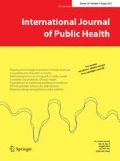Zusammenfassung
Die Gruppe konzentrierte sich auf die Problematik der Beeinflussung von Gesunden und kam dabei zu folgenden Schlussfolgerungen:
-
1.
Gesundheitserziehung ist interdisziplinär und hat nicht nur den einzelnen, sondern auch soziale Normen und Institutionen sowie die Gesetzgebung zu berücksichtigen und zu beeinflussen.
-
2.
Familie und Schule spielen dabei eine hervorragende Rolle.
-
3.
Erkenntnisse der Kommunikationsforschung müssen vermehrt berücksichtigt werden.
-
4.
Gesundheitserziehung sollte in der Schule in möglichst viele Fächer des Lehrplans integriert werden. Essentiell sind Beispiel und Ausbildung des Lehrers.
-
5.
Gesundheitserziehung darf sich nicht nur auf Wissensvermittlung beschränken, sie muss vor allem die Motivation zu einem gesunden Leben im Auge haben.
-
6.
Der Erfahrungs- und Informationsaustausch soll durch eine Arbeitsgruppe im Rahmen der Gesellschaft für Sozial- und Präventivmedizin gefördert werden.
-
7.
Die Interventionsstudien des Nationalen Forschungsprogramms la in Aarau und Nyon können wertvolle Impulse für eine Verbesserung der Gesundheitserziehung in unserem Lande geben.
Summary
Discussions concentrated on ways of influencing the behavior of healthy individuals. The following was concluded:
-
1.
Health education is an interdisciplinary activity. It should not merely be aimed at the behavior of individuals but also respect and influence values and institutions of society as well as legislation.
-
2.
Family and school are the most important fields of activity.
-
3.
Health education should be based on experiences from communication sciences.
-
4.
In school, health education should be integrated in as many subjects as possible. Of special importance are the example of the teachers and adequate preparation and training.
-
5.
Health education cannot limit itself to giving information, it also must motivate to a healthy way of life.
-
6.
Exchange of experiences and information in health education should be improved. In Switzerland this can be done by a working party of the Swiss Society for Social and Preventive Medicine.
-
7.
The intervention trials of the Swiss National Research Program can provide important stimuli for innovative approaches to health education in Switzerland.
Author information
Authors and Affiliations
Additional information
Rapport du groupe de travail «Education pour la santé» lors du congrès Forum Davos 78: Limites de la médecine III, La prévention et ses possibilités
Rights and permissions
About this article
Cite this article
van der Linde, F., Hornung, R., Stricker, H. et al. Rendre l'éducation pour la santé plus efficace. Soz Prāventivmed 23, 356–359 (1978). https://doi.org/10.1007/BF02074225
Published:
Issue Date:
DOI: https://doi.org/10.1007/BF02074225

